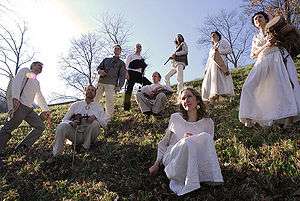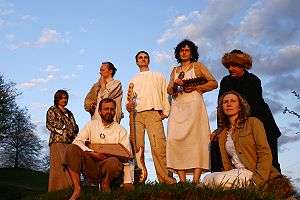Atalyja
Atalyja (“The rain is coming”) is a Lithuanian folk-rock music band. It seeks to popularize archaic Lithuanian folklore and bring the ancient songs closer to the contemporary listener. The band's creations boast a big variety of musical styles, rich tonal palette and unique and ingenious arrangements. The ancient melodies are enriched with elements of rock, jazz, funk, blues rock, metal and Indian music. Atalyja regularly participates in music festivals and fests. The band has released 4 CD albums and gave performances in Lithuania, Latvia, Estonia, Poland, Germany, Turkey, Czech Republic, Belarus and Russia.


Over more than ten years of its existence Atalyja has earned love of listeners of different age groups. The main part of the repertoire consists of sutartinės (polyphonic archaic songs – glees), calendar, war-historical, and wedding songs. Musical expression ranges from meditative improvisation to hard compositional art rock. Experimentation is not unfamiliar to the band musicians – the melodies of traditional songs are mixed with elements of classic rock, metal rock, blues rock, funk, and progressive rock, as well as classical music.
The band's composing manner is marked by professional, dainty artistical arrangements, rich tonal palette, diverse rhythms, and unique polyphony. Traditional Lithuanian instruments (kanklės, panpipes, violin, bagpipe, jaw harp are ingeniously combined with electric and bass guitars, rock percussion. Some songs are coloured with oriental shades of North Indian instruments: the bansuri (transverse Indian bamboo flute) as well as tabla (Indian pair drum).
History
Lithuanian folkrock band Atalyja formed in the autumn of 1998, and in the spring of 1999 they made their debut in Kaunas, in postfolk festival “Suklegos”. A year later, the debut album “atalyja” (2000 MC, 2001 Kukū records CD) was released. It received international attention, and was appreciated in folk and world music magazines. The second album „Močia“ (The Mother) which saw daylight in 2004 (CD, Dangus records) is marked by vivid, warm sound. It was recognized as one of the most solid modern folk music releases in Lithuanian discography. In the third album “Saula riduolėla” – “Sun the Roller” (2009, Dangus records) “strict” composition blends with improvisation and experiments in an original way. Not only is the solar theme emphasized by the titles of some songs or the album itself, but is also further strengthened by the album's colourful and sunny sound.
Currently there are three female vocalists in the band – Gedimina Statulevičienė, Audronė Daraškevičienė and Darutė Pilibavičienė (who also plays kanklės) as well as one male vocalist and kanklės player Rytis Ambrazevičius. Group's multiinstrumentalist Ernest Jepifanov plays the bansuri (Indian flute), viola, bagpipe, and panpipes; Eirimas Velička plays the violin, kanklės, jaw harp. Bass guitar and kanklės are played by Gediminas Žilys, electric and acoustic guitars are played by Ugnius Keturka, and the percussion is handled by Salvijus Žeimys. The band gave concerts in Poland (2000, 2001, 2005, 2006, 2008, 2009), Estonia (2002), Latvia (2002, 2009), Germany (2006), Turkey (2008), Czech Republic (2009), took part in Lithuanian radio and television programs. It is a common participant in Lithuanian folk, postfolk and neofolk festivals and city and town feasts. “Atalyja” continually plays at the festivals “Mėnuo Juodaragis”, “Baltic sound”, “Suklegos”, “Gyvosios archeologijos dienos”, “Skamba skamba kankliai”. The band's music is used in numerous art projects, films, and theater performances.
The group was awarded as the ethnoband of the year at the alternative music awards "A.LT"2008.
In 2009 the band arranged the presentation of the new album ,,Saulala Riduolela" ("Sun The Roller") in Vilnius and Kaunas, gave concerts in Minsk (was filmed by Belarusian ONT TV television for a musical programme), in Riga (Latvia), Prague (in musical club "Acropolis"), Olsztynek and Gdańsk (Poland). In 2009 November 25 and 26, gave a Christmas Tour in the capital of Russia – Moscow (on the 25th – club, Masterskaya", 26th – cultural centre of Lithuanian embassy, Jurgis Baltrusaitis House).
Members
- Gedimina Statulevičienė – vocal
- Audronė Daraškevičienė – vocal
- Darutė Pilibavičienė – vocal, kanklės
- Ernest Jepifanov – bansuri, viola, bagpipe, jaw harp, skudučiai (panpipes), vocal
- Rytis Ambrazevičius – vocal, kanklės, bagpipe, jaw harp
- Eirimas Velička – violin, kanklės, bagpipe, jaw harp, vocal
- Ugnius Keturka – electric guitar, acoustic guitar
- Gediminas Žilys – bass, kanklės, vocal
- Salvijus Žeimys – percussion
Discography
- Atalyja; MC, 2000
- Atalyja; CD, 2001
- Močia; CD, 2004
- Žemaitiu ruoks; EP, 2008
- Saula Riduolėla; CD, 2009